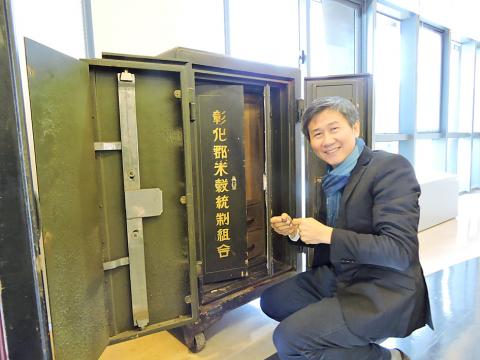The Changhua County Cultural Affairs Bureau has saved two top-heavy Japanese-era safes from being thrown out by the county government.
The safes originally stood in the Changhua County Government’s offices, bureau Director Chen Wen-pin (陳文彬) said, adding that they are huge and were of no use, so they were going to be removed and sold to a used goods business.
Fortunately, the county’s Department of General affairs notified the bureau, and after an inspection, the bureau immediately “rescued” the safes and moved them back to its offices, Chen said, adding that each weighs more than 1 tonne.

Photo: Lin Liang-che, Taipei Times
Their exteriors are completely intact and their interiors have been kept in good condition, Chen said, adding that even the cabinets’ copper keys were kept.
According to trademarks on the exterior, the safes were manufactured in Tokyo in the 1930s, Chen said.
Printed on the interior doors are also the words “Changhua County Rice Control System” (彰化郡米穀統制組合), the name of a semi-public organization established in the 1930s, Chen said.
During the Japanese colonial era, the office of the governor-general of Taiwan set up rice-control systems in different administrative regions. The systems were all led by large local rice suppliers.
The office hoped to use the organizations to gain a grasp of rice production and output, but during the war period, the organization became an institution for governmental control of rice production, sales and rationing.
The regional rice control systems were canceled after the war, Chen said, adding that their assets were absorbed by the different local governments and the Changhua County Government might have acquired the two safes in this way.
As the objects are old, symbolic of their time and well-preserved, they could be transferred to the Institute of Changhua County History as treasured pieces, Chen added.
The safes have been temporarily placed in the sixth-floor lobby of the bureau’s offices.

DEFENSE: The National Security Bureau promised to expand communication and intelligence cooperation with global partners and enhance its strategic analytical skills China has not only increased military exercises and “gray zone” tactics against Taiwan this year, but also continues to recruit military personnel for espionage, the National Security Bureau (NSB) said yesterday in a report to the Legislative Yuan. The bureau submitted the report ahead of NSB Director-General Tsai Ming-yen’s (蔡明彥) appearance before the Foreign and National Defense Committee today. Last year, the Chinese People’s Liberation Army (PLA) conducted “Joint Sword-2024A and B” military exercises targeting Taiwan and carried out 40 combat readiness patrols, the bureau said. In addition, Chinese military aircraft entered Taiwan’s airspace 3,070 times last year, up about

Taiwan is stepping up plans to create self-sufficient supply chains for combat drones and increase foreign orders from the US to counter China’s numerical superiority, a defense official said on Saturday. Commenting on condition of anonymity, the official said the nation’s armed forces are in agreement with US Admiral Samuel Paparo’s assessment that Taiwan’s military must be prepared to turn the nation’s waters into a “hellscape” for the Chinese People’s Liberation Army (PLA). Paparo, the commander of the US Indo-Pacific Command, reiterated the concept during a Congressional hearing in Washington on Wednesday. He first coined the term in a security conference last

A magnitude 4.3 earthquake struck eastern Taiwan's Hualien County at 8:31am today, according to the Central Weather Administration (CWA). The epicenter of the temblor was located in Hualien County, about 70.3 kilometers south southwest of Hualien County Hall, at a depth of 23.2km, according to the administration. There were no immediate reports of damage resulting from the quake. The earthquake's intensity, which gauges the actual effect of a temblor, was highest in Taitung County, where it measured 3 on Taiwan's 7-tier intensity scale. The quake also measured an intensity of 2 in Hualien and Nantou counties, the CWA said.

The Overseas Community Affairs Council (OCAC) yesterday announced a fundraising campaign to support survivors of the magnitude 7.7 earthquake that struck Myanmar on March 28, with two prayer events scheduled in Taipei and Taichung later this week. “While initial rescue operations have concluded [in Myanmar], many survivors are now facing increasingly difficult living conditions,” OCAC Minister Hsu Chia-ching (徐佳青) told a news conference in Taipei. The fundraising campaign, which runs through May 31, is focused on supporting the reconstruction of damaged overseas compatriot schools, assisting students from Myanmar in Taiwan, and providing essential items, such as drinking water, food and medical supplies,